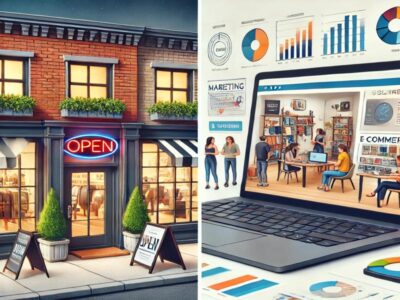This post may contain affiliate links. If you click and make a purchase or sign up, we may earn a commission at no extra cost to you. Thank you for supporting us!
Starting a business is an exciting yet challenging endeavor, and one of the first major decisions you’ll face is choosing between a brick-and-mortar or an online business. Both models offer unique benefits and challenges, making it essential to evaluate your goals, budget, and target audience before making a decision. In this guide, we’ll break down the key factors to help you determine which business type is the best fit for you.
1. Startup Costs and Investment
Brick-and-mortar businesses require a significant upfront investment. Costs include leasing or purchasing a physical location, renovations, utilities, inventory, and staffing. In contrast, online businesses have lower startup costs, as they eliminate the need for a physical storefront. Expenses are typically limited to website development, marketing, and inventory (if applicable). If you have a limited budget, an online business may be the more practical option.
2. Customer Reach and Accessibility
A physical store caters to a specific geographic area, making location a crucial factor in its success. Foot traffic, accessibility, and local competition play significant roles in determining profitability. On the other hand, an online business can reach customers worldwide, offering greater scalability and the potential for a larger customer base. If you want to expand your business beyond a local market, an online presence is highly beneficial.
3. Customer Experience and Engagement
Brick-and-mortar stores offer face-to-face interactions, allowing for personalized customer service and a tactile shopping experience. Customers can see, touch, and try products before making a purchase, which can lead to higher satisfaction and reduced returns. Online businesses, however, rely on digital interactions, making customer engagement reliant on user-friendly websites, chat support, and virtual assistance. If personalized service and in-store experiences are important to your business model, a physical store may be preferable.
4. Operational Flexibility and Work-Life Balance
Running a brick-and-mortar store requires a fixed location and set business hours, limiting flexibility. Business owners often need to be present or hire employees to manage daily operations. In contrast, online businesses offer greater flexibility, allowing owners to operate from anywhere with an internet connection. This model is ideal for entrepreneurs seeking a better work-life balance and the ability to manage their business remotely.
5. Marketing and Customer Acquisition
Traditional businesses rely on local marketing strategies such as flyers, billboards, and word-of-mouth referrals. While these methods can be effective, they may be limited in reach compared to digital marketing strategies. Online businesses have access to powerful tools like social media advertising, search engine optimization (SEO), and email marketing, which allow for targeted customer acquisition. If digital marketing is your strength, an online business might be the right choice.
6. Competition and Industry Trends
Certain industries thrive in a brick-and-mortar setting, such as restaurants, salons, and fitness centers, where physical presence is essential. However, many retail businesses are shifting online due to changing consumer preferences and advancements in e-commerce technology. Understanding industry trends and customer expectations can help you determine which model aligns best with your business goals.
7. Risk and Scalability
Brick-and-mortar businesses come with higher risks due to fixed expenses, location dependence, and economic downturns that may impact foot traffic. Online businesses, while also competitive, offer easier scalability. With the ability to automate processes and expand product offerings without geographical constraints, online businesses can grow faster with lower financial risk.
Conclusion
The choice between a brick-and-mortar and an online business ultimately depends on your goals, budget, and industry. If you thrive in face-to-face interactions and enjoy a structured work environment, a physical store may be the right fit. However, if you prefer flexibility, lower startup costs, and global reach, an online business may be the better choice. Evaluating your personal strengths and business vision will help you make an informed decision and set yourself up for long-term success.


Great breakdown of the pros and cons! I personally lean towards online businesses due to the flexibility and lower startup costs they offer. The ability to reach a global audience without the overhead of a physical location is a huge plus. However, I completely understand the appeal of brick-and-mortar stores, especially for businesses that thrive on face-to-face interactions. It really comes down to aligning your business model with your personal goals and strengths.